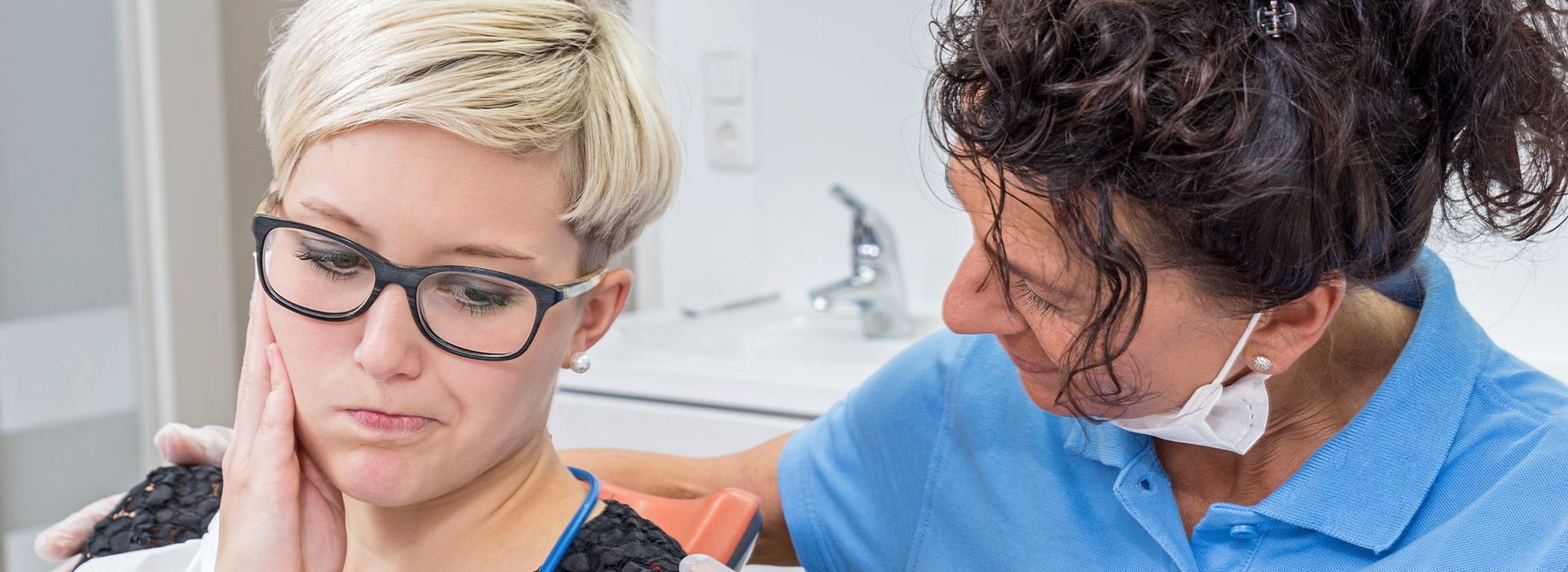
When a dental emergency happens, quick, sensible action can make a big difference in outcome and comfort. If you experience sudden, severe pain, persistent bleeding, a knocked-out tooth, or a broken restoration, take a moment to assess safety first: stop any heavy bleeding with gentle pressure, rinse the mouth with warm water to clear debris, and avoid placing anything sharp or irritating against the injured area. For a dislodged permanent tooth, try to handle it by the crown only, rinse it gently (do not scrub), and, if possible, place it back into the socket or keep it moist in milk or a saliva-filled container while you seek care.
Stay calm and avoid common but harmful responses, such as using household glue to reattach a crown, attempting invasive home corrections, or ignoring severe swelling or fever. These signs can indicate infection or deeper tissue involvement that requires prompt professional attention. If you’re in doubt about whether a situation is urgent, err on the side of caution: untreated dental trauma and infections can progress quickly and affect your overall health.
Our team understands how unsettling emergencies can be. If you are near our Cicero location, you can expect clear guidance from the moment you call—what to do immediately and how soon to come in. Immediate steps taken before you reach the office are intended to preserve teeth and reduce the risk of complications until professional treatment is available.
Not every dental problem requires the same speed of response, which is why effective triage is essential. When you contact our office, a trained team member will quickly assess symptoms to prioritize care. Severe bleeding, an avulsed (knocked-out) tooth, extreme swelling that affects breathing or swallowing, and signs of spreading infection are treated as high priority and handled as soon as possible. Less time-sensitive issues—such as a loose filling that isn’t painful—may be scheduled for early availability that same day or the next appropriate slot.
We strive to see emergency patients promptly, providing same-day appointments whenever the schedule allows. Our approach balances immediacy with thoughtful planning: the goal is to relieve pain quickly and then create a clear, safe treatment plan to address the underlying problem. Expect a short intake process focused on your symptoms, medical history, and any medications you take—this information helps us tailor care and avoid complications during treatment.
Throughout triage and treatment scheduling, communication is prioritized. We’ll explain expected wait times, the nature of the initial procedures, and any immediate comfort measures we’ll use to control pain and swelling. Patients appreciate knowing what to expect; clear information reduces anxiety and allows you to participate in decisions about your care.
Some dental emergencies are common and straightforward to treat when handled early. Severe toothaches can result from deep decay, a cracked tooth, or an infected nerve; care may include temporizing measures for pain control followed by a restorative procedure such as bonding, a new filling, or a crown. If infection has reached the inner tissues of the tooth, root canal therapy is often the best option to save the natural tooth and resolve pain.
Trauma-related injuries—chipped, fractured, or loosened teeth—require assessment of both visible damage and the tooth’s vitality. Small chips may be repaired with bonding or a veneer, while larger fractures often need a crown to restore strength and function. A completely dislodged tooth has its best chance of survival if reimplanted quickly; our team will examine, stabilize, and, when appropriate, perform procedures to support long-term retention.
Soft-tissue injuries, broken restorations, loose or lost crowns, and problematic wisdom teeth are other frequent causes for urgent visits. Oral infections and abscesses demand immediate attention because they can spread or cause systemic symptoms; treatment commonly involves drainage, antibiotics when indicated, and targeted dental procedures to remove the source of infection. For denture-related problems, we provide adjustments or temporary solutions to restore comfort and function while avoiding further irritation.
Accurate diagnosis is the foundation of effective emergency care. We use up-to-date diagnostic tools—digital radiography for clear, low-radiation imaging and intraoral cameras for a magnified view of problem areas—to determine the extent of damage or infection quickly. These technologies help us create precise treatment plans that minimize guesswork and speed recovery, and they make it easier to explain findings so patients feel informed and involved.
Pain control is a top priority from the moment you arrive. Our team employs a range of evidence-based strategies to manage discomfort, including local anesthetics, short-acting medications for immediate relief, and, when appropriate, conscious sedation options to help anxious patients remain comfortable during necessary procedures. We select the safest approach based on your medical history, the urgency of the treatment, and your comfort preferences.
In addition to in-office techniques, we provide clear instructions for at-home symptom management—how to use cold compresses, which over-the-counter remedies are reasonable for short-term relief, and when to seek further care if symptoms worsen. These practical steps bridge the gap between arrival and definitive treatment, helping patients feel steadier and more secure until the underlying issue is resolved.
After an emergency procedure, the next phase focuses on recovery and long-term stability. Immediate follow-up care may include a short course of medication, protective restorations, or a temporary prosthesis to maintain function while a definitive solution is planned. We provide straightforward, written aftercare instructions tailored to the procedure you received, emphasizing wound care, diet modifications, and signs that warrant a return visit.
If a tooth cannot be preserved, modern restorative options allow you to rebuild a natural-looking, fully functional smile. Implant dentistry, fixed bridges, and removable dentures are among the reliable choices we discuss with patients. Each option has clinical considerations—such as bone volume and overall oral health—that determine the best path forward, and we present these in clear, practical terms so you can make an informed decision with your care team.
Preventing future emergencies is also part of our approach. We review measures such as protective mouthguards for sports, timely restorative care to stabilize vulnerable teeth, and routine checkups that catch problems before they escalate. With attentive follow-up and a partnership between patient and clinician, many urgent situations can be avoided or significantly mitigated.
Quick, competent emergency dental care protects both your comfort and your long-term oral health. At Value Dental Center, our team is prepared to deliver calm, evidence-based treatment when you need it most. If you have questions about emergency care or want to learn more about how we handle urgent dental needs, please contact us for more information.

Pain is your body's way of signaling that something is not quite right and though there are many reasons for oral pain, one of the most common complaints and reasons for seeking urgent dental care is a toothache. Whether you simply need a dental filling, a crown, or require a root canal procedure to save your tooth, we'll alleviate your discomfort and restore the look and function of the involved tooth.

Dental trauma can result in a defect as minor as a small chip in tooth enamel to a more extensive and painful crack or fracture. With sufficient force, a tooth can even be displaced or completely knocked out of its socket. With prompt emergency care, many injured teeth can be restored and saved.

The last teeth in your mouth to develop, wisdom teeth often do not have enough room to fully erupt or may be positioned in the wrong direction. These issues can affect your dental health as well as overall well-being. Our office provides skilled care to address the complications caused by problematic wisdom teeth.

A broken or lost dental prosthesis or restoration can cause embarrassing gaps in your smile as well as compromise your ability to eat and speak with ease. If you've lost or broken a dental filling, denture, crown, or other dental appliance, you can rely on our office to perform a prompt repair or provide a durable and cosmetically pleasing replacement as quickly as possible.
At the office of Value Dental Center, emergency appointments are always available. Of course, in addition to providing top treatment for dental emergencies, we also welcome patients searching for high quality and affordable care. We offer a complete range of the latest and best cosmetic and dental services for every member of your family.
If you are suffering from a toothache or have sustained a dental injury, it is important to visit the dentist as soon as possible before more serious complications arise. Whether your dental emergency is painful, if it affects the appearance of your smile, or if you suspect that an infection is present, our office will make every effort to see you as promptly as possible for care.
At the office of Value Dental Center, we treat your dental emergency as our top priority. Our caring team will respond to your emergency call right away, making sure you get the gentle, state-of-the-art care you need without delay.
As your trusted emergency dentist in Cicero, we provide the highest quality of care to mitigate the stress, anxiety, and discomfort of dental problems. Our dedicated team will help you start feeling better as soon as we receive your emergency call.
At the office of Value Dental Center, we provide skilled and experienced care to effectively resolve a broad range of dental emergencies, restoring a patient's oral health while protecting their overall wellbeing.
However, even so, specific dental emergencies pose significant threats to one's health. These situations require immediate, emergency room care. Serious and potentially life-threatening dental emergencies include significant oral and facial trauma such as jaw fractures, deep wounds or lacerations to the face and mouth, an abscess or infection that causes widespread facial or submandibular swelling, or affects breathing and swallowing.
At the office of Value Dental Center, we provide prompt, skilled, and experienced care to address dental emergencies. We understand that finances are always a concern and do our best to provide options in care that are both affordable and respect your budget.
Once we've had the opportunity to examine your smile, we can give you a clear picture of any existing dental issues, along with a quote for what the cost of treatment will be. The cost of care all depends upon the extent and complexity of issues affecting the health or appearance of your smile and the types of procedures that are required.
To help alleviate any additional stress or delay, you can count on our staff to work with you to optimize coverage for your dental care and to minimize your out-of-pocket expenses. For patients without insurance, we strive to make things easier as well! We invite you to visit our financial information page or speak to an expert in our business office.
Dental emergencies are often painful and debilitating experiences. For this reason it's important to have an emergency dentist in Cicero, who welcomes patients with urgent dental needs while providing the prompt care required to restore oral health.
Here are just some of the reasons why so many patients choose our office for emergency dental care and to meet their family's dental needs:
We're dedicated to helping patients enjoy good oral health and beautiful smiles. We look forward to helping you keep your smile in tip-top condition. You can rest assured that our highly skilled office team will provide you the highest quality of state-of-the-art dental care and have you smiling again in no time!
To make an appointment or for more information on our office and the many state-of-the-art services we provide, give us a call today.
A dental emergency is any oral health condition that requires immediate attention to relieve severe pain, control bleeding, or prevent permanent damage. Common examples include intense toothaches, traumatic injuries to the mouth, knocked-out teeth, and rapidly spreading infections or swelling. Conditions that interfere with breathing or swallowing are especially urgent and require immediate medical evaluation.
If you experience any of these symptoms, contact the dental office or your local emergency services right away so the situation can be triaged. Quick action can often preserve teeth, limit infection, and reduce the need for more extensive treatment later. The dental team will advise whether you need to come in for emergency care or seek hospital treatment for life-threatening symptoms.
Begin by gently rinsing your mouth with warm salt water to help remove debris and reduce inflammation. You can use over-the-counter pain relievers according to the package directions to manage discomfort until you can be seen, but avoid placing aspirin directly on the gums or tooth. Applying a cold compress to the outside of the cheek can also help control swelling and reduce pain.
Contact the dental office as soon as possible to describe your symptoms so staff can triage your situation and schedule an appropriate appointment. The dentist will evaluate the tooth to identify the cause, which may include decay, infection, or trauma, and recommend targeted treatment to resolve pain and protect your oral health. Prompt diagnosis reduces the risk of complications and increases the chance of saving the natural tooth.
If a tooth has been completely knocked out, act quickly and handle the tooth by the crown only to avoid damaging the root surface. If possible, gently rinse the tooth with plain water without scrubbing, then try to reinsert it into the socket and hold it in place until you can see the dentist. If reinsertion is not possible, store the tooth in milk or a saline solution and bring it with you to the office; time is critical for successful reimplantation.
Call the dental office immediately for emergency treatment, as a tooth that is replanted within an hour has the best chance of long-term survival. The dentist will assess the tooth, clean the area, and stabilize the tooth if reimplantation is feasible, often followed by a root canal at a later date. Quick professional care gives the best chance of preserving the natural tooth and preventing further complications.
Rinse your mouth with warm water to clean the area and use a cold compress on the face to reduce swelling. Retrieve and bring any broken pieces of tooth to your appointment, and avoid chewing on the affected side to prevent further damage. If you have sharp or jagged edges that irritate the tongue or cheek, cover them temporarily with a piece of sugarless gum or dental wax until you can see the dentist.
The dentist will examine the tooth and determine the appropriate repair, which may include smoothing and bonding minor chips or placing a crown for larger fractures. Treatment aims to restore function and appearance while protecting the tooth from infection and further breakage. Timely evaluation reduces the likelihood of needing more invasive procedures later.
Seek emergency dental care for wisdom tooth pain when you have severe, persistent pain, swelling that affects your ability to open your mouth, difficulty swallowing, or signs of spreading infection such as fever and facial swelling. These symptoms can indicate an impacted tooth, pericoronitis, or an abscess that requires prompt attention. If bleeding is heavy or you cannot control it, seek immediate care.
The dentist will evaluate the wisdom tooth with a clinical exam and, if needed, radiographs to determine the cause of pain and the best course of action. Treatment may include cleaning and irrigating the area, prescribing antibiotics for infection, or extracting the problematic tooth if it is the source of recurrent or severe problems. Early intervention prevents the spread of infection and alleviates acute discomfort.
Dental infections and abscesses are typically treated by addressing the source of infection, controlling pain, and reducing swelling. The dentist may perform drainage of the abscess, prescribe antibiotics when there is evidence of spreading infection, and recommend definitive treatment such as root canal therapy or extraction to eliminate the infected tissue. Managing systemic symptoms and preventing the infection from spreading are primary goals of emergency care.
After the initial emergency treatment, the dental team will outline follow-up care to fully resolve the infection and restore oral health. This may include additional procedures to save the tooth, restorations, or referrals for more advanced care when necessary. Prompt professional care reduces the risk of serious complications and supports faster recovery.
Yes, the office makes every effort to see emergency patients on the same day they call, even if they are new to the practice. Staff will triage your call, assess the urgency of the problem, and schedule the earliest available appointment to address pain, swelling, or trauma. If immediate in-office care is not possible, the team will advise on interim steps to manage symptoms safely at home.
When you arrive for an emergency visit, the dental team will perform a focused exam and determine the treatment needed to relieve pain and stabilize the situation. The goal is rapid, precise care to control infection, protect teeth, and restore oral function whenever possible. Clear communication about symptoms helps the team prioritize care and deliver the most appropriate emergency treatment.
For short-term relief, rinse gently with warm salt water to reduce inflammation and dislodge debris, and use over-the-counter pain relievers following package directions to manage discomfort. A cold compress applied to the outside of the cheek in 10- to 15-minute intervals can help control swelling and numb pain. Avoid placing aspirin or other medications directly on the gums or tooth, as topical application can cause tissue irritation.
If there is a broken restoration or exposed tooth structure, cover sharp edges temporarily with dental wax or sugarless gum to protect soft tissues. Keep the head elevated when lying down to minimize throbbing and blood flow to the area. These measures are supportive; you should still seek professional dental care promptly to address the underlying cause.
The dental team will always evaluate options for saving a natural tooth when possible because preserving the tooth offers the best long-term function and oral health outcomes. Treatment to save a tooth may include restorations, dental bonding, crowns, or root canal therapy depending on the extent of damage or infection. The decision is based on clinical findings, radiographic evaluation, and the tooth's structural integrity.
When a tooth cannot be saved due to extensive damage, severe infection, or structural compromise, extraction may be recommended to protect overall oral health. If extraction is necessary, the dentist will discuss restorative options to replace the missing tooth and restore function. At Value Dental Center, the team prioritizes conservative approaches while providing clear explanations of recommended treatments and next steps.
Bring a form of identification, any recent radiographs if available, and a list of current medications and medical conditions to help the clinical team assess your needs safely. If you have a piece of a broken tooth, crown, or restoration, place it in a clean container and bring it with you to the appointment. Be prepared to describe the onset, duration, and severity of symptoms so the team can triage and prioritize care effectively.
During the visit, the dentist will perform a focused exam and may take radiographs to diagnose the issue and determine the appropriate emergency treatment. You can expect immediate measures to control pain and infection followed by discussion of definitive care and follow-up appointments. The team will also provide home care instructions and explain warning signs that require additional attention.
Quick Links